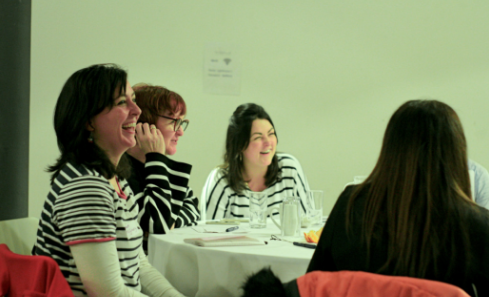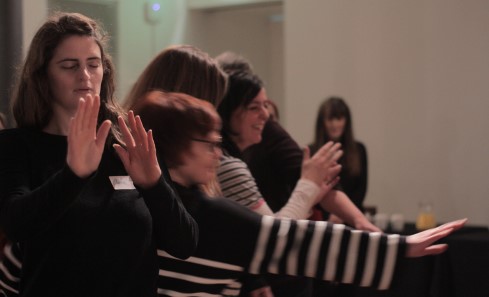
Theatre maker and participatory artist Martin O’Connor reflects on ideas of risk and play inspired by the latest Creative Learning event from Creative Scotland. Tassos Stevens from Coney invites to play a series of games that asks us to question our own sense of playfulness, participation and rule-making.
“What happens with what we do and how do we make it better?” asks Tassos Stevens, whose irreverence never betrays his serious approach to having fun. Stevens is artistic director and joint CEO of Coney, an interactive theatre company with games, adventures and play at its heart, and is concerned most with how people take part in participatory settings, and how play can inspire and provoke. Their work engages people in new and surprising ways, and asks what can be discovered when playing and making work with others.
Some examples of their work include The Droves, a promenade performance made for young people for an adult audience; The Young Coneys, who recently intervened in a car industry award ceremony; and A Game of Legacy, a moving exploration of friendship, collaboration and the passing on to posterity. This last project, much like most of the work, is difficult to define or explain given the mysterious and immediate nature of the work. In fact, Stevens reminded me personally not to reveal too much about the company and the work, perhaps in fear of spoilers, but perhaps in jest. I’m still not sure. That’s the beauty about Stevens and Coney – to participate, you have to commit.
As we saw with Mark Storor and Emily Gee earlier in the day, using a slower process over a longer than average period can result in a more authentic and genuine project, and one of Coney’s projects, A Lovely Intervention, also follows this rule, and has been in development for three years. Teaming up with Wandsworth Probation Service, Coney worked with a section of offenders who are high frequency thieves, and learned that if they were to stop stealing the crime rate would go down by 20%.

Normally Coney’s practice can be quite secretive: in fact, Stevens claims, Coney is a front for a playful secret agency to make the world a lovelier place. Again, not sure how serious he is being here, but it’s more fun to play along, and most in the room were happy to get on board.
The most frequent mission for an agent, says Stevens, is making a gift for a stranger, with a lovely impact for the people who both receive and give them. And logically Stevens asked why not try to introduce this gift giving to offenders, which is the opposite of stealing but can utilise the same skills. And so we see the parallels between Coney’s practice and the practice of the offenders, and how a serious issue can become the most joyful.
But we weren’t going to simply talk about play – of course if you’re going to explore the topic, it’s important to try it for yourself. And so we found ourselves playing Grandmother’s Footsteps, each time reflecting and suggesting how to improve the game and our experience of it.
Stevens then asked to participate in a magic trick. But of course, like his work, it is not what it seems. Again we were invited to engage in play with our fellow participants around the table, and to suggest ways in which each game can be improved. And very subtly, each time we were instructed by Stevens, we found that the boundary between play and our own practice was blurred. And in asking us to feedback, we seemed to be suggesting ways in which our work or our lives could be improved, such was the profundity of the suggestions:
And at the end I was left with my own list of suggestions: Keep offering; Add incrementally; Give yourself more time.
Tips for good gameplay or tips for life? I was left wondering if there is any difference at all.
This event is part of a series of events planned by Creative Scotland’s Creative Learning team taking place from November 2018 to March 2019. The events aim to inspire practice and support networking and skills development. For more information and to keep informed of events visit the Creative Learning events page.
This blog is based on the event Risk, innovation and experimenting in participatory arts, which took place at The Lighthouse, Glasgow on Monday 13 December 2018.